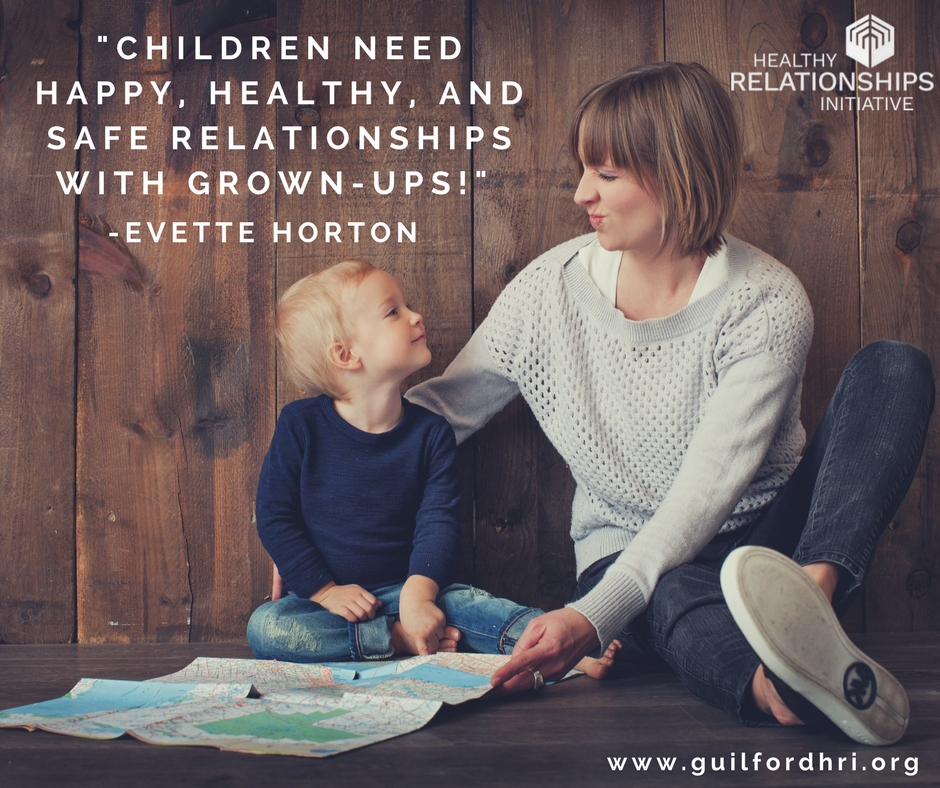
By Evette Horton, Ph.D., NCC, LPCS, RPT-S
Children need happy, healthy, and safe relationships with the primary grown-ups in their lives to help them grow and develop in to happy and healthy adults. Researchers have followed infants and children over time and found that the infants and children who had safe relationships with their primary caregivers, as compared to children who experienced unsafe and scary relationships with their primary caregivers, became more happy, healthy, and productive adults!
Thanks to advances in research technology, we now know why children who experience the adults that they care about being unhappy and unsafe, such as in cases of domestic violence, have poorer outcomes than children who don’t have those experiences. Researchers have found that these unhappy and unsafe experiences physiologically stress the child’s developing nervous system. Over time, these physiologically stressful experiences can have a negative impact on the child’s mental and physical health. For example, children who have experienced domestic violence in their homes are at a higher risk for mental health issues, such as anxiety, depression, and behavior problems, and physical illnesses, such as asthma, allergies, and gastrointestinal disorders. Further, the consequences of these childhood experiences impact mental and physical health well into the adult years. Researchers have found that childhood experiences of domestic violence are associated with adult illnesses, such as substance abuse, anxiety, depression, and heart disease.
Researchers are finding that even infants are susceptible to the stress of domestic violence. Previously, many believed that infants and very young children would not remember or were too young to be impacted by domestic violence; however researchers have found otherwise. In one recent study, infants who were asleep were measured for signs of physiological stress as their caregivers were either talking quietly or arguing in the next room. The infants who heard their caregivers arguing in the next room, had elevated stress responses even as they slept.
Of course, some infants and children are going to hear or see some unsafe or scary events during their childhood, and though it may be stressful to the child, they can generally learn to cope with comfort and support from the adults in their lives. However, when the stressors continue over time and/or other life stressors are experienced, more mental and physical damage may be done.
Though these findings may feel scary to some, they also give us the knowledge to help children who have had these experiences. Fortunately, there are multiple, effective interventions designed to help children cope and recover from these experiences. There are also mental health providers who work with infants, children, and caregivers, that deliver these interventions and support families. It is important to share this information with others who may not understand that infants and children can be impacted by domestic violence. It is also important be alert to families who you suspect may be experiencing domestic violence and refer them to providers for support. Though the phrase, “it takes a village” has been used frequently, it accurately describes how all community members can work together to help all children have happy, healthy, and safe relationships with their caregivers.
 Evette Horton, Ph.D., NCC, LPCS, RPT-S, is a Clinical Assistant Professor at the University of North Carolina at Chapel Hill’s School of Medicine. She has over 20 years’ experience working with children and families in both school and community settings. Evette specializes in the social and emotional assessment and treatment of young children, the impact of maternal substance use on infants and children, attachment based parenting interventions, and evidence-based models of treatment for young children.
Evette Horton, Ph.D., NCC, LPCS, RPT-S, is a Clinical Assistant Professor at the University of North Carolina at Chapel Hill’s School of Medicine. She has over 20 years’ experience working with children and families in both school and community settings. Evette specializes in the social and emotional assessment and treatment of young children, the impact of maternal substance use on infants and children, attachment based parenting interventions, and evidence-based models of treatment for young children.
Evette received her Ph.D. in Counselor Education in 2013 from the University of North Carolina at Greensboro. She also has a Masters of Education from the University of North Carolina at Chapel Hill and a Bachelor’s of Science in Psychology from Bowling Green State University in Bowling Green, Ohio.
She currently serves on the Association for Child and Adolescent Counseling (ACAC) national board. She serves on the editorial board for the Journal of Child and Adolescent Counseling. She is also a founding board member of the North Carolina Infant Mental Health Association (NCIMHA).
